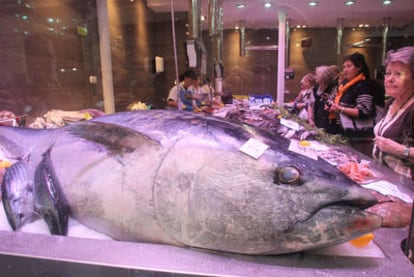No more spinach for babies: health department issues new food warnings
Recommendations include limiting intake of tuna, swordfish and shellfish
Forget about adding spinach or chard to your baby's food. And pregnant women and children under the age of three should not eat bluefin tuna or swordfish. As for shellfish, it is best not to indulge too often. The Spanish Agency for Food Safety and Nutrition (AESAN) has gotten stricter with its recommendations about the consumption of these food items due to high levels of mercury in the larger fish, cadmium in crustaceans and nitrates in vegetables. Joan Llobet, a pharmacy professor at Barcelona University, described the recommendations as "reasonable" even if they create "social alarm" and are "economically dangerous."
Until now, AESAN recommended that pregnant women and toddlers eat no more than 100 grams of swordfish or dogfish a week, and no more than two servings of bluefin tuna. The fatty tissue in these predatory fish species soaks up the mercury found in their prey, in the very toxic form of methylmercury. This metal, which is chiefly generated by industrial activity, is accumulated by aquatic organisms all the way up the food chain until it is consumed by humans, and it can cause serious alterations to neural development in fetuses and very young children.
An expert described the guidelines as "reasonable", even if they do cause alarm
"The presence of this metal varies from one fishing ground to the next, and the Mediterranean is highly contaminated," says Llobet. The larger fish species are typically migratory, meaning that those coming in from less-contaminated waters are also at risk for high levels of methylmercury.
When the fishing industry pressured AESAN to lower the maximum acceptable levels of mercury in fish, the agency asked its scientific committee to reassess the risks. "[The committee] concluded that not only was there no room for relaxing the standards, but that most women and children are in fact already near the acceptable limit for this toxic substance," says Victorio Teruel, head of AESAN's chemical-risk-management area. The agency is now suggesting that pregnant women and children under three years of age refrain entirely from eating swordfish, dogfish or bluefin tuna, and reduce consumption for children between three and 12 to no more than 50 grams a week.
As for vegetables, the trouble lies with nitrates, a naturally occurring compound present in soil but whose concentration increases through the intensive use of fertilizers. Plants, especially leafy ones like spinach, lettuce and chard, absorb them. "Nitrates by themselves are not very toxic, but the human body converts them into nitrites, which can cause cyanosis or 'blue baby syndrome,' caused by a lack of oxygen in the blood," explains Teruel.
Following conclusions reached by the European Food Safety Authority, AESAN has decided to recommend, for the first time, that parents refrain from feeding spinach to infants under one year of age, or if they do, to ensure it represents no more than 20 percent of food intake. "The spinach should not be kept at room temperature because these conditions can double the amount of nitrite," says Fernando Pérez, a pediatrician at Severo Ochoa Hospital in Leganés, Madrid. "Cyanosis is a rare disease, but nitrate is also a gastric irritant," adds Eduardo Rodríguez Farré, a researcher at the Barcelona Biomedical Research Institute. "It has also been linked to cancer."
The Spanish agency is less strict about crustaceans, since they are not consumed as much as the other foods. Cadmium, a heavy metal that is a byproduct of mining and industry, is found in high doses in seafood, where it accumulates in the viscera (in the case of shrimp and crabs, these are located in the head). The metal builds up in human livers and kidneys and can cause kidney dysfunction. Since the abdomen and leg meat is not dangerous, ASEAN is merely recommending that people do not eat too many shrimp and crab heads.
These health recommendations could have an economic impact on agricultural production in a country that has already sustained losses of ?51 million over the recent E. coli outbreak in Germany or "cucumber crisis." That is why it should be explained that vegetables grown in the open air have lower concentrations of nitrate because sunlight favors its elimination. Farré believes that AESAN did the right thing: "It's done out of precaution; you cannot put public health at risk."

Tu suscripción se está usando en otro dispositivo
¿Quieres añadir otro usuario a tu suscripción?
Si continúas leyendo en este dispositivo, no se podrá leer en el otro.
FlechaTu suscripción se está usando en otro dispositivo y solo puedes acceder a EL PAÍS desde un dispositivo a la vez.
Si quieres compartir tu cuenta, cambia tu suscripción a la modalidad Premium, así podrás añadir otro usuario. Cada uno accederá con su propia cuenta de email, lo que os permitirá personalizar vuestra experiencia en EL PAÍS.
¿Tienes una suscripción de empresa? Accede aquí para contratar más cuentas.
En el caso de no saber quién está usando tu cuenta, te recomendamos cambiar tu contraseña aquí.
Si decides continuar compartiendo tu cuenta, este mensaje se mostrará en tu dispositivo y en el de la otra persona que está usando tu cuenta de forma indefinida, afectando a tu experiencia de lectura. Puedes consultar aquí los términos y condiciones de la suscripción digital.








































